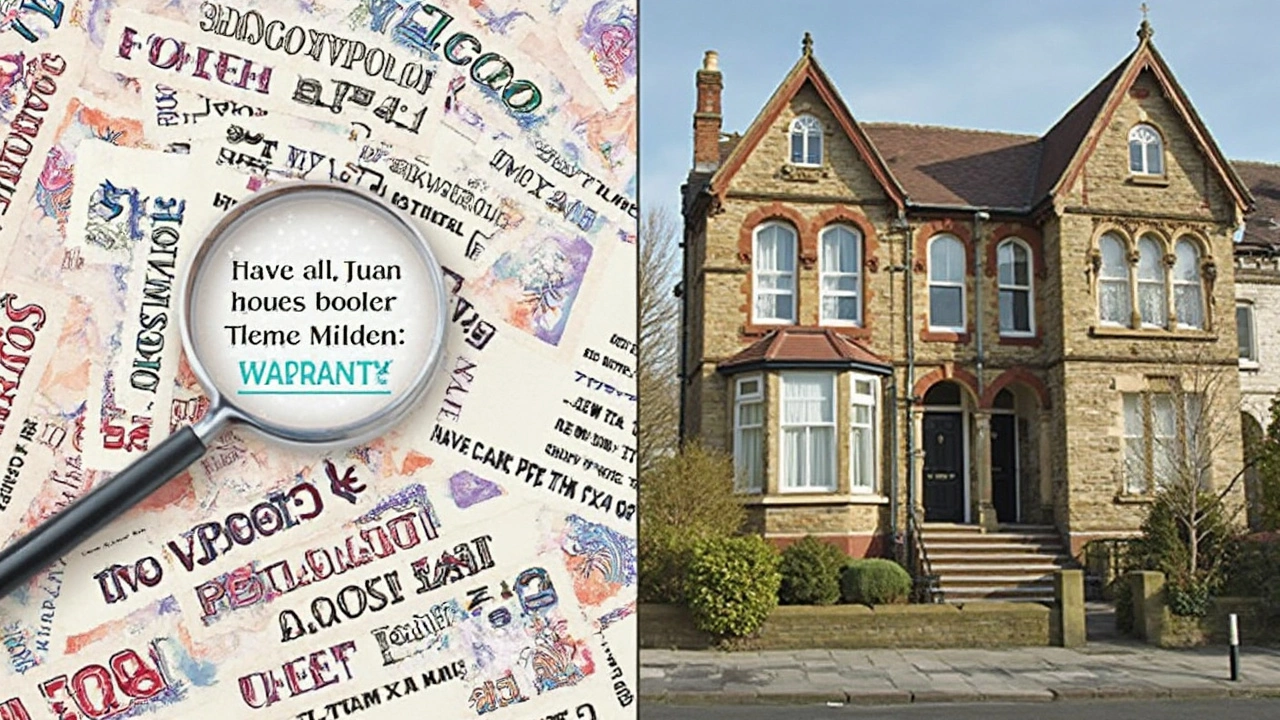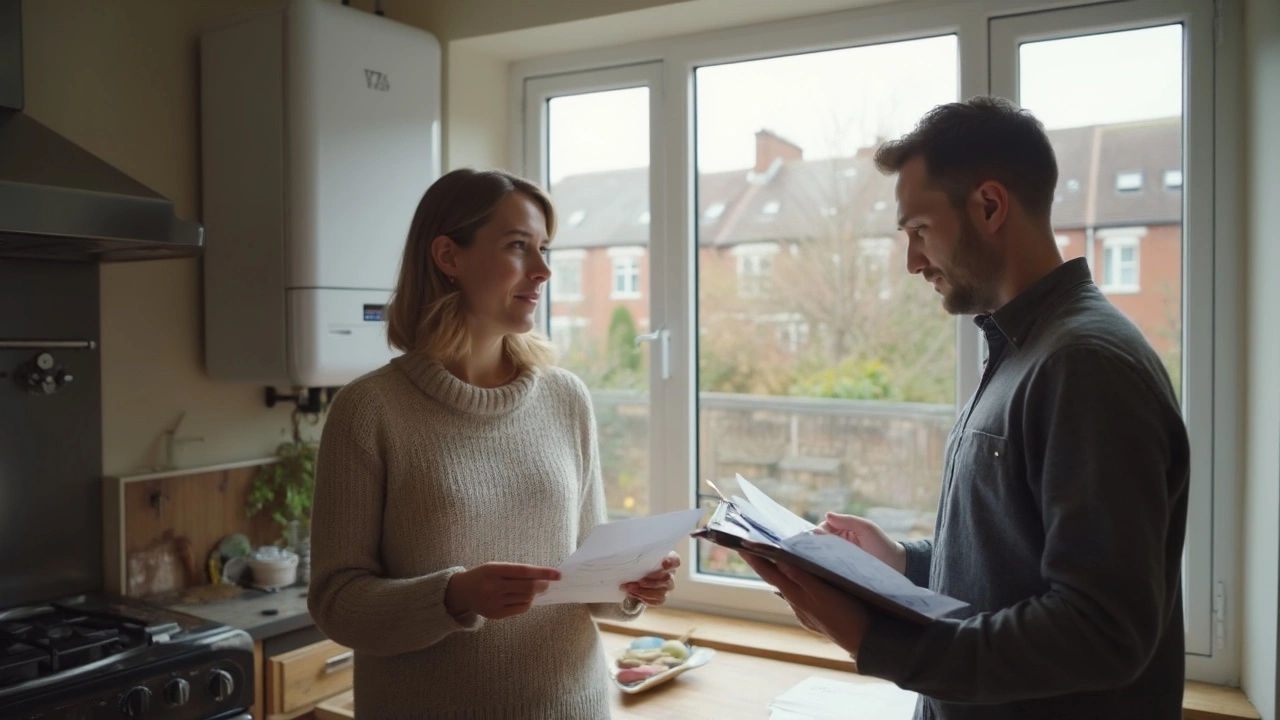Boilers fail at the worst moments—like right when Rowan’s in the bath and the water goes ice-cold. If you’re shopping for a new boiler, you want to know the real cost, not the sales pitch. Most people end up paying more because they don’t know what’s normal or where surprises can pop up.
Prices in 2025 have shifted. A typical new combi boiler runs from £2,000 to £3,500, including installation. That’s for a standard home—so if yours is bigger or the plumbing is complicated, costs can climb. If someone is offering a super low price, you should be suspicious—it usually means they’re skipping corners, or you’ll get hit with extra fees later.
What most folks don’t realise is that it’s not just about the boiler itself. The installation work can be a huge chunk of the bill. Moving your boiler to a new spot? Fitting new pipework? That adds hundreds. And if your home isn’t up to current safety standards, you might need an upgrade first—another hidden expense.
- Boiler Cost Breakdown: The Real Numbers
- What Impacts the Final Price?
- Installation: Don’t Get Caught Out
- Dodgy Extras and Hidden Fees
- Getting the Best Deal: Tips That Work
Boiler Cost Breakdown: The Real Numbers
Getting your head around boiler prices can feel like cracking a secret code, especially when you’re bombarded with deals online. Here’s what you’re really looking at for a brand new setup in the UK in 2025.
If you want a straightforward combi boiler for an average three-bed house, budget between £2,000 and £3,500. That covers the boiler, labour, and basic extras. Fancy a system or regular boiler instead? Then you’re looking at £2,500 to £4,500 all-in.
Here’s a quick cost breakdown you can actually use:
- Boiler cost: £800 – £2,000 (combi models at the lower end; premium brands are pricier)
- Labour to install: £800 – £1,200 (standard swap, same location)
- Pipes, flues, or filters: £200 – £600
- Extras like system flush or smart thermostat: £200 – £400
If your job isn’t a simple swap, add more. For example, moving the boiler to a new room can tack on £300 to £700 due to extra pipework and rerouting flues. And if your radiators or gas supply need upgrades, that’s an added £100 to £400 each.
Most brands sit in the same ballpark: Worcester Bosch, Vaillant, and Ideal are common and reliable, but even the ‘budget’ options aren’t dirt cheap. The trick is making sure you don’t pay for things you don’t need, or get stung by sneaky extras after the quote.
Keep in mind—these numbers are for a full professional installation. If you see a quote way under £1,800 for everything, double-check it’s not just the boiler alone. That’s how people end up with an expensive box sitting unused in the garage while they wait (and freeze) for a proper installer.
What Impacts the Final Price?
Sticker shock is real when you start collecting new boiler quotes. The price isn’t just about picking a boiler model and plugging it in. There’s a whole mix of things that push the cost up—or keep it reasonable.
The biggest factor? The type of boiler. A combi boiler is usually the cheapest to install, while system and regular (heat-only) boilers often cost more because they need extra kit like hot water cylinders or tanks. Here’s a handy comparison:
| Boiler Type | Average Supply & Fit Cost (2025) |
|---|---|
| Combi | £2,000–£3,500 |
| System | £2,300–£4,000 |
| Heat Only | £2,400–£4,200 |
The size of your home matters, too—a bigger house needs a more powerful boiler, which bumps the price. And if you want top-end brands like Worcester Bosch or Vaillant, expect to pay a premium (up to £500 more compared to budget brands). Going budget? That can mean higher running costs down the road, so it’s a trade-off.
Installation is where folks really get caught out. If your boiler swaps “like-for-like” in the same spot, it stays cheaper. Moving locations or switching from a regular to a combi boiler? That’s where labour hours and material costs ramp up, sometimes by £500–£1,000—especially if walls need patching up or new gas lines are needed.
There’s also the age of your current set-up to think about. Older homes often need extra work to bring the pipework or electrics up to scratch. This can add a few hundred quid, and many people forget to budget for it until it’s too late.
- The complexity of your pipework—the more fiddly, the pricier.
- Location—London and the South East are normally 10–20% more expensive.
- Warranty length—longer warranties can bump up the initial price but save on future repair bills.
- Extras—like smart thermostats, additional radiators, or filters, often add £100–£400.
Here’s the kicker: some suppliers throw in extras to sweeten the deal, but others nickel-and-dime for every little thing. Always ask for an itemised quote so you can compare apples with apples. One good tip—if you’re replacing an old boiler, ask if they’ll take the old one away and dispose of it for free (saves on a skip fee).
It’s easy to fixate on the boiler price, but installation and the bits around it count for just as much. When you’re talking to installers, drop the term boiler cost into your questions—it shows you know what you’re talking about and makes it easier to cut through sales bluster. If you can see how every part of the job breaks down, it’s much harder for anyone to pull a fast one on you.

Installation: Don’t Get Caught Out
Installation is where things get tricky and where unexpected expenses often show up. People think buying a new boiler is mostly about the unit itself, but installation can actually eat up half—or more—of the total cost. Even if a boiler looks cheap online, getting it properly fitted might send the price through the roof.
Here’s the thing: a straightforward, like-for-like swap usually takes a day and costs less. If your boiler’s moving across the house or you’re switching from a regular to a combi, expect a multi-day job. That means more labour, more kit, and sometimes extra specialist visits (like electricians for upgrades).
To give you an idea, here’s a breakdown of average installation times and what bumps up the cost in 2025:
| Type of Installation | Typical Duration | Average Cost (Inc. Labour & VAT) |
|---|---|---|
| Combi to Combi (same place) | 1 day | £2,000 - £2,500 |
| Regular to Combi (extra plumbing) | 2 days | £2,700 - £3,500 |
| Moving boiler location | 2-3 days | £3,200+ |
Don’t forget council rules and gas safety checks—installers need to be Gas Safe registered. If the installer isn’t, it could mess up your home insurance, or even be dangerous. Always double-check their registration number before agreeing to anything.
Here’s a quick list to keep you from getting caught out:
- Ask for a full breakdown in your quote—parts, labour, warranties.
- See if extra pipework is included (it often isn’t).
- Confirm all old kit removal and disposal is covered.
- Check for hidden charges on system upgrades or certification.
- Make sure the boiler cost includes VAT—don’t get tricked by net prices.
If you’re someone who likes to plan, keep in mind that some brands and installers offer fixed-price deals. These can be a safe bet when you want to dodge last-minute extra charges—just read the small print to see what’s really covered.
Dodgy Extras and Hidden Fees
This is where a lot of people trip up with getting a new boiler. You think you've bagged a solid quote, but when the bill hits, there's a laundry list of extra charges. The thing is, some companies love to leave important bits out of the first quote, then hit you with surprise costs once work begins.
The big one is disposal of your old boiler. I've seen bills where carting it off cost £100–£150, even though most fitters include it in their main quote. Also, if your water pressure is weak or the gas line needs work, that’s often not spotted until installation day. Suddenly, you’re looking at a few hundred quid extra—nowhere in the ad.
- Powerflushing your heating system can add £300–£600. Some installers push it, but it's only needed if your pipes are gunked up.
- Upgraded controls or smart thermostats usually cost extra. Simple controls are standard, but a proper smart thermostat can add £150–£250, including fitting.
- Adjusting pipework, especially if your old boiler isn't in the same spot—budget another £200–£500 depending on the mess.
- Some companies charge extra for a vertical flue (if your boiler vents through the roof) versus a horizontal one (through a wall). Expect up to £200 more for a vertical setup.
Watch out for the “scaffolding charge” too, if your boiler's high up or in a tricky spot. I’ve seen quotes with a £400 fee just for that. Ask about everything upfront—don’t be shy. The best way to avoid getting fleeced? Make sure your quote is totally all-in. If it’s vague, walk away.
Here's a quick look at some typical extra fees in 2025:
| Extra | Average Cost (£) |
|---|---|
| Old Boiler Disposal | 120 |
| Pipe Upgrades | 300 |
| Smart Thermostat Installation | 200 |
| Powerflush | 450 |
| Scaffolding | 400 |
If you see a boiler cost quote that’s way below the rest, check twice for hidden extras. A good installer spells it all out at the start, no suprises.

Getting the Best Deal: Tips That Work
Scoring the best price on a new boiler isn’t rocket science, but there are traps that’ll drain your wallet if you’re not watching. The main thing? Never settle for the very first quote. Always get at least three written quotes from different local installers. Some companies use high-pressure tactics; if you feel rushed, walk away. Take your time to compare what’s actually included—like warranties, parts, and aftercare.
A lot of big-name firms tend to charge more just because of their badge, while solid local installers might give you the same kit, properly fitted, for hundreds less. Check reviews—not just star ratings, but actual stories people share about reliability, mess, and sticking to price. Ask if they’re Gas Safe registered; every legit installer is, and you can find them easily on the official register.
Look out for ‘free’ extras, too. Sometimes, a low headline price skips things like thermostats, chemical flushes, or safe removal of your old boiler. These can add up fast. Before agreeing, get a fully itemised quote that shows each job and part. This makes it way harder for someone to spring rogue costs on you.
If you can, do your homework on grants and finance options. In 2025, there are still government-backed schemes for upgrading old boilers to more energy-efficient models, especially heat pumps. While not everyone qualifies, asking never hurts—you could slice a big chunk off your bill.
- Always compare at least three quotes before picking an installer.
- Make sure every installer is Gas Safe registered (you can check online).
- Ask for a detailed, itemised quote, not just a lump sum.
- Double-check anything that’s not included—like thermostats, filters, or system flushes.
- Look for discounts or government help, especially if your current boiler’s ancient or inefficient.
When you follow these steps, you've got a much better shot at a fair deal, less stress, and a boiler that just works every time you need it—trust me, your toes will thank you next winter.


